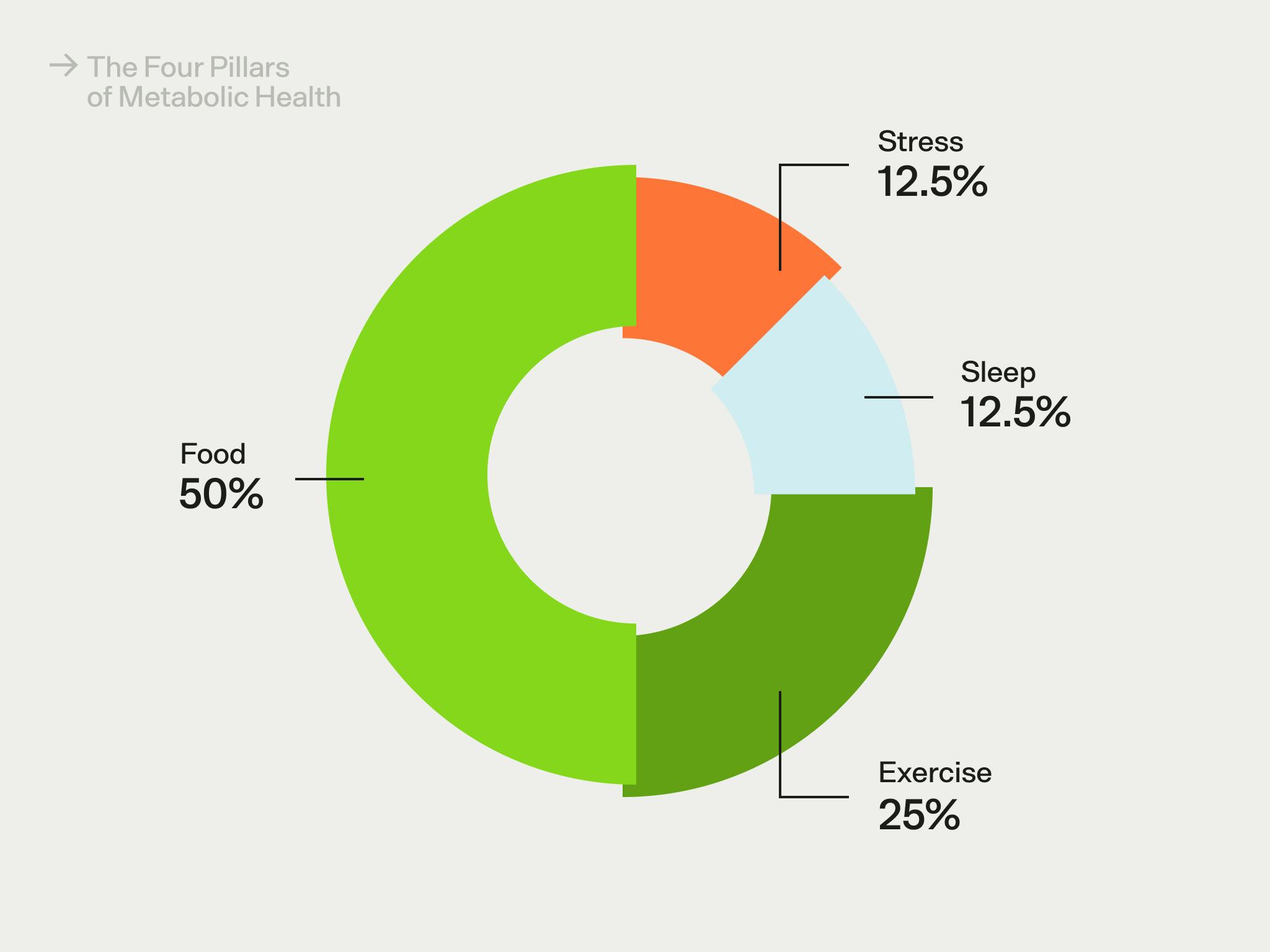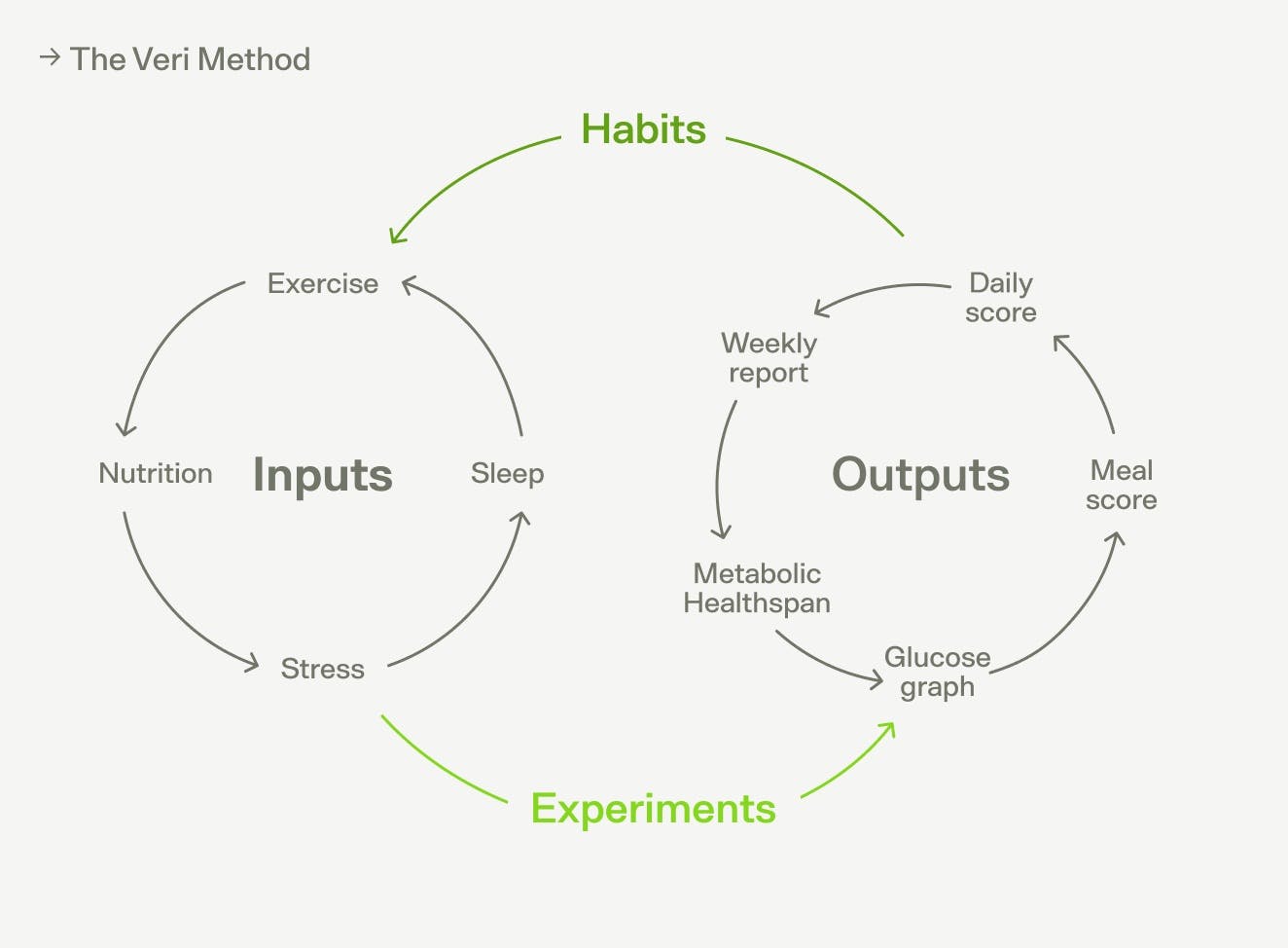We’re in a metabolic health crisis. More than 93% of Americans are metabolically unhealthy, and most don’t even know it [1]. Globally, obesity is projected to affect 2 billion people (25% of the population) by 2035.
Even if you aren’t overweight or prediabetic, there are many reasons to pay close attention to your metabolic health, which is linked to everything from your energy levels to your hormones, mood, metabolism, and more.
But that begs the question — where do you start to improve your metabolic health? And even more importantly, how do you build sustainable habits that you can stick to?
This is where the Four Pillars come in.

The Four Pillars are food (or nutrition), exercise, sleep, and stress.
What are Veri’s Four Pillars?
When we talk about behaviors that influence metabolic health, we at Veri often refer to our Four Pillars: food, exercise, sleep, and stress.
The Four Pillars are the most impactful areas for improving behaviors that are linked to balanced glucose levels, greater insulin sensitivity, and all-around better metabolic function. We call habits in these pillar areas your “metabolic habits,” and each one plays an important and unique role in your health.
Why these four areas specifically?
Research indicates that the Four Pillars are the most powerful levers you can pull for your metabolic health [2, 3, 4, 5]. Like the pillars of a building, they provide a strong foundation that supports a life free from disease, pain, and illness. Put another way, they help you extend your healthspan so you can enjoy a higher quality of life, even as you age.
This isn’t cause for alarm — missing a few hours of sleep here and there or taking a break from exercise isn’t going to significantly hamper your goals or affect your health. But if you consistently neglect the Four Pillars over a long period of time, you may set off a vicious cycle that can lead to conditions such as insulin resistance, prediabetes, obesity, and even metabolic syndrome.
How do the Four Pillars affect metabolic health?
The key to understanding the Four Pillars is glucose, your body’s preferred energy source. All the food you eat is ultimately used or stored as glucose, which circulates through your bloodstream to fuel your cells.
In order to turn glucose into energy, your pancreas releases the hormone insulin to “unlock” cells and allow glucose in. If you think of glucose as “money” for the body, insulin is the “money manager” hormone that helps you regulate spending and saving.
If your insulin response isn’t working normally, your body can’t make proper use of glucose. As it turns out, the Four Pillars all affect your body’s ability to regulate glucose via insulin in different ways.
- Nutrition. Both what you eat and when you eat can affect your body’s glucose response. In general, eating fiber-rich, low-GI fruits and vegetables in a variety of colors, lean proteins, and healthy fats can all lead you in the right direction. At the same time, avoid processed foods and refined sugar. The goal is to stabilize your glucose levels and turn extreme spikes and crashes into gentle rolling peaks and dips that stay within a healthy range.
- Exercise. Getting consistent exercise is a key part of better metabolic health and improved body composition. While just one session can make a difference in your glucose response and offer benefits for heart health, the aim is to regularly practice a combination of resistance (strength) training and aerobic exercise to build muscle mass, which absorbs more glucose from your bloodstream than fat mass and increases insulin sensitivity.
- Sleep. Both sticking to a consistent sleep schedule and getting enough sleep every night are key to stable glucose levels — just one night of bad sleep can reduce insulin response, and lead to higher blood glucose levels the following day. To improve your sleep hygiene, practice these science-backed tricks.
- Stress. Cortisol, the stress hormone, can trigger a healthy and normal acute stress response that comes and goes. But if you experience stress that doesn’t subside over an extended period of time — i.e., chronic stress — you put yourself at greater risk for insulin resistance, fertility problems, and more. Practicing stress management techniques can help lower cortisol levels.
How to use Veri to track your metabolic habits
A lot of traditional health advice is centered around numerical results — such as eating a certain number of calories, or losing a certain number of pounds. But focusing on the end result puts too much pressure on the “output” rather than all of the hard workthat goes into producing the desired result.
In other words, this mindset doesn’t empower you to make long-term changes to your lifestyle and, in turn, your health.
On top of that, every body is different — and even though we can make educated predictions about the effects of the Four Pillars on health, there is no one-size-fits-all approach.
This is where the Veri Method comes in.

Veri can help you building lasting habits that contribute to improved metabolic health.
The Veri Method: inputs vs. outputs
The Veri Method focuses on bite-sized inputs, which are your metabolic habits related to the Four Pillars (nutrition, exercise, sleep, and stress). By using Veri as your guide, you can create positive feedback loops that help you build lasting habits towards lifestyle change and better health.
The personalized feedback you receive along the way, as measured by reports in the Veri app (your glucose graph, meal scores, daily scores, and healthspan), helps you understand exactly where you are succeeding, and what areas of your health need tweaking. It’s precisely this science-backed methodology that can help you reach your health goals and make changes that stick.
What you can do to discover your own metabolic habits
Everything in the Veri app is designed around improving metabolic habits as they affect the Four Pillars. That means you can monitor your glucose levels throughout the day and connect the dots as they pertain to meals, sleep, exercise, stress, and other events in your life.
For example, you may notice that eating a certain food triggers a glucose spike. Using this knowledge, you can experiment the next time you eat it to isolate factors that might be contributing to that glycemic response. For example:
- Pair the food with fiber or a healthy fat.
- Go for a 10-minute walk after eating the food.
- Take a tablespoon of apple cider vinegar before eating the food.
- Eat it earlier in the day, rather than later (when you are naturally less insulin sensitive).
Don’t worry if you’re new to all of this. With the Veri app, you don’t have to interpret your own results or jump to conclusions blindly. Instead, we empower you to build lasting habits by acting as a personalized 1:1 metabolic adviser, helping you decode the data into meaningful, actionable steps.
Here are some ways we accomplish this:
- Tracking. In the Veri app, you can log your meals, activities, and other life events — as well as integrate heart rate and exercise data from Apple Health and other apps.
- Scoring. We take your glucose data and provide Meal Scores and Daily Scores to help you understand your body’s glucose response to specific foods.
- Guidance. We take the guesswork out of your metabolic health plan with “My Journey,” which explains key concepts behind metabolic health, how to apply them, and how to use Veri to achieve your goals. We also connect you with a private community of Veri users, where you can swap ideas and tips.
- Outcomes. We worked with leading researchers and experts to build Metabolic Healthspan, which shows you exactly where you are on the spectrum of metabolic health in real-time so you can take back control of your well-being.
Takeaways: learn more about the Four Pillars
Whether or not you use Veri, paying attention to the Four Pillars can often lead to significant improvements in your metabolic health. To get started, take a look at our educational resources for each of the pillars below, focusing on one to get started. If you use the Veri app and have already identified areas where you want to build better habits, you can head straight to those pillars for more guidance.
Nutrition
- Using the Power of Food to Balance Your Blood Sugar Levels
- Eat the Rainbow: 6 Colors You Should Add to Your Plate
- A Beginner’s Guide to Time-Restricted Eating
- 5 Little-Known Micronutrients That Are Crucial for Heart Health
- 7 Ways to Manage Your Glucose While Traveling
- How Does Alcohol Affect Blood Sugar Levels?
- Should You Eat Breakfast Before or After Your Workout?
- Why Am I So Tired After Eating Lunch?
Exercise
- How Exercise Affects Your Metabolic Health
- The 5 Best Exercises for Insulin Resistance and Metabolic Health
- Is There a Best Time of Day to Exercise for Metabolic Health?
- 4 Common Myths About Exercise and Heart Health
- 4 Exercise Tips to Improve Your Metabolic Health
Sleep
- How Bad Sleep Affects Your Metabolic Health (and What to Do About It)
- How to Hack Your Sleep for Better Metabolic Health
- What Happens to Your Glucose Levels During Sleep?
Stress
- How to Manage Your Stress for Better Metabolic Health
- What Is Cortisol and How Does It Affect Insulin Resistance?


